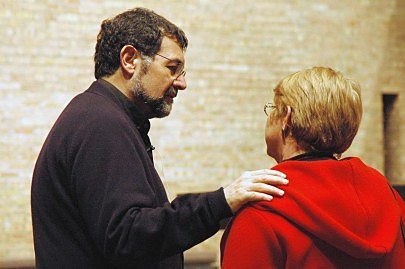June 16, 2014
Here is the simple (and not so simple) question: Why is it hard to forgive?
Ask Father Frank Desiderio, CSP, and he will instantly reply: “Because we are hard-wired for justice.”
“We are afraid we are letting people off the hook if we forgive, and without forgiveness, there can be no reconciliation,” added Father Desiderio, who is offering people an opportunity to explore the path to forgiveness with a parish mission and retreat titled, “Can You Let Go of a Grudge?”
The three-day parish missions and shorter retreats begin with a viewing of the movie, “The Big Question: A Film About Forgiveness.” The movie – executive produced by Father Desiderio when he was serving as president of Paulist Productions – explores astonishing acts of forgiveness, courage and will, featuring Desmond Tutu, Sister Helen Prejean, Thich Nhat Hanh, Sri Sri Ravi Shankar and Hopi Elders. Participants then explore the theology of forgiveness and related topics such as justice, anger and revenge and the five steps to forgiveness summed up in the acrostic LET GO:
- Look deeply and long at what went wrong;
- Empathy for the other is key;
- Tell the story differently;
- Give the gift of forgiveness freely;
- One day at a time keep forgiveness strong.
“People say to me all the time, ‘This has really helped me let go of something that was bothering me for a long time,’” said Father Desiderio, who serves on the Paulist leadership team as first consultor.
Father Desiderio said he expected to meet people who were suffering from the grief and anger of broken relationships, divorce or past mistakes but what really amazed him are the number of people who have come to him needing to “let go” of feelings of being cheated out of an inheritance. Whether it is between siblings, children and a step-parent or other loved ones of the deceased, “what has surprised me is that this situation has come up as often as it has,” he said.
Sometimes entire parishes need forgiveness, if a pastor has embezzled funds or some other tragedy has caused pain.
“They can walk this path together and begin to rebuild their community of faith,” said Father Desiderio.
With a parish or with individuals, the timing of forgiveness is especially important.
“The community is grieving some form of loss,” Father Desiderio explained. “They need to go through the stages of outrage and anger and grief. After they go through that process, when they are tired of being held in bondage to bitter feelings, that is the time to explore forgiveness. But I would never dishonor their grief by starting a process of forgiveness too quickly.”
This ministry has also caused Father Desiderio to take an internal look at his own capacity for forgiveness.
“I have to participate in the process I am teaching about,” Father Desiderio said. “I have to ask myself, ‘An I holding on to resentment or am I a forgiving person?’” When asked if he had any final thoughts he said, “When we have exhausted the avenues of justice, what is left to us is forgiveness.”
For more information, visit forgivenessretreats.org
